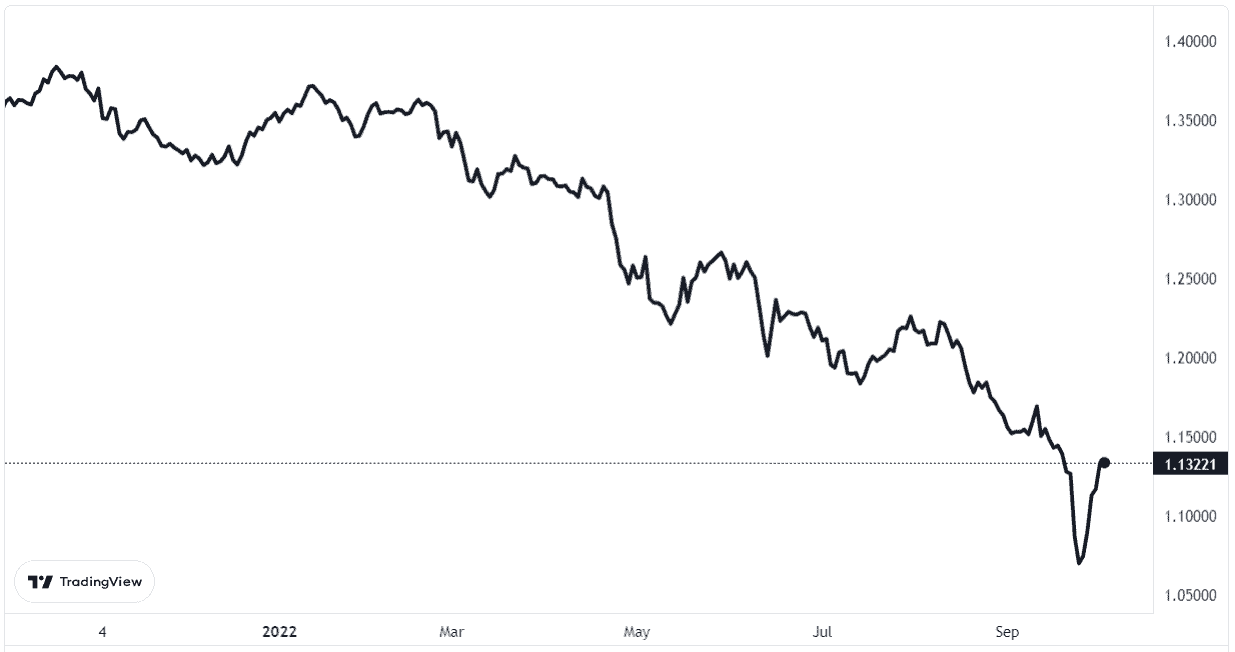I’ve been closely monitoring the UK stock market since the ‘mini budget’ on 23 September. The government’s drive for economic growth included a £45bn package of tax cuts that spooked traders. Gilt yields soared, sterling plummeted, and most FTSE 100 shares went into a tailspin.
The near future could be turbulent for investors like me. Nonetheless, some Footsie stocks look more resilient than others to weather storms ahead. Here are two I’d buy today.
London Stock Exchange Group
London Stock Exchange Group (LSE:LSEG) was one FTSE 100 share to tick higher in the wake of Chancellor Kwasi Kwarteng’s statement. The company’s been a top performer this year — its share price has risen nearly 8%.
Should you invest £1,000 in HSBC right now?
When investing expert Mark Rogers has a stock tip, it can pay to listen. After all, the flagship Motley Fool Share Advisor newsletter he has run for nearly a decade has provided thousands of paying members with top stock recommendations from the UK and US markets. And right now, Mark thinks there are 6 standout stocks that investors should consider buying. Want to see if HSBC made the list?
So, why did London Stock Exchange (LSE) shares react positively to the government’s measures? First, let’s examine interest rates.
In light of inflationary pressures, the Bank of England’s chief economist Huw Pill warned that fiscal stimulus injected into the economy “will require a significant monetary policy response“. Some experts forecast the base rate could exceed 5.5% by next spring.
The LSE owns majority stakes in transactional interest rate swap businesses, such as TradeWeb and SwapClear. Rising interest rates are likely to boost growth for these companies. In turn, this should contribute to the exchange’s bottom line.
A second key factor behind the LSE’s positive momentum is market volatility. Elevated trading volumes contribute to the exchange’s income. With further fiscal statements due in the months ahead, the LSE should benefit as traders continue to focus on British shares.

The stock isn’t without risks. A weak pound, Brexit, and a dwindling IPO pipeline are threats to London’s position as a leading equity market. If fewer firms choose to list on the London Stock Exchange, this could limit future growth prospects for the company.
However, London’s been a global financial centre for centuries. I’m not convinced this status will be displaced overnight. Everything considered, I’m bullish on LSE shares — I’d buy.
AstraZeneca
Healthcare is traditionally viewed as a defensive sector and AstraZeneca (LSE:AZN) is perhaps the jewel in the FTSE 100’s pharmaceutical crown. The stock’s outpaced the index, climbing over 15% this year.
AstraZeneca’s diversification allows it to deal with currency risks as sterling yo-yos. The business generates greater total revenue in both emerging markets and the US than in Europe.
The business also stands to benefit from recent approvals for cancer drugs and Covid-19 treatments. I view this as the reward for a decade of increased R&D investment under CEO Pascal Soriot’s leadership.
In further developments, the Anglo-Swedish outfit recently acquired US-based LogicBio Therapeutics, a genome editing company, paying a handsome 660% premium on its share price.
The deal may look expensive. However, I’m encouraged to see the firm executing ambitious expansion plans while many other businesses are simply treading water.
Admittedly, AstraZeneca has a stubbornly high valuation. This does concern me — that the firm’s strong growth potential in oncology has already been priced in. A 2.2% dividend yield isn’t too exciting either.
Nonetheless, the AstraZeneca share price has nearly doubled over five years. I believe there’s every chance it can continue to perform well over the next five. I’d add to my position today.








